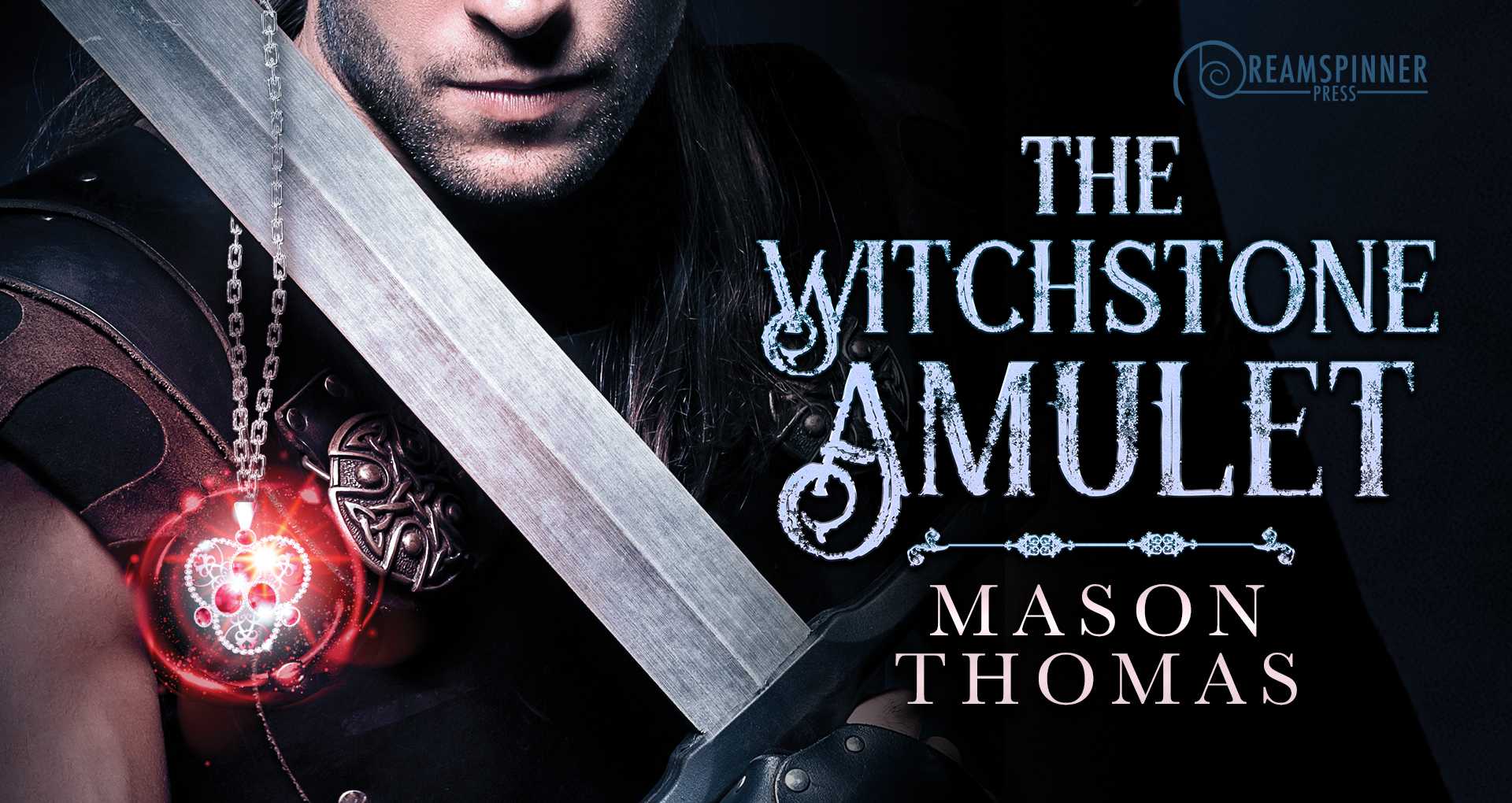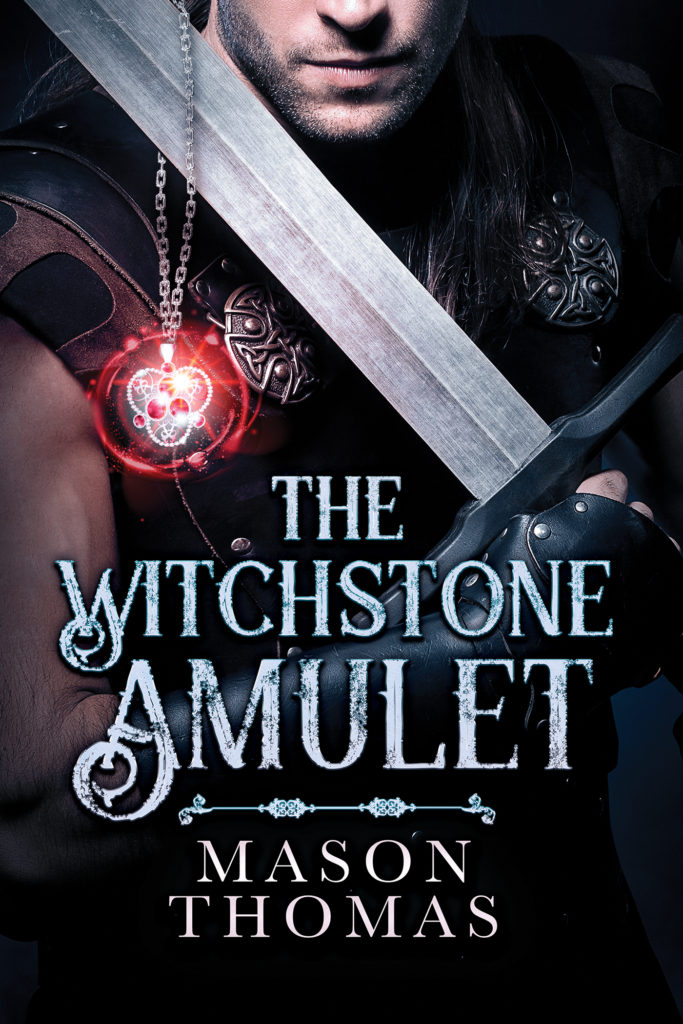A warm welcome to author Mason Thomas joining us today to talk about new release “The Witchstone Amulet”.
Welcome Mason
Casting your Novel
Let me brag about my husband for a moment.
He is a former National Spelling Bee competitor. To this day, when the Bee is on TV, he watches it like it’s the super bowl. He’ll pause it after each word is announced to see if he can spell it correctly first. This has made him freakishly good at scrabble, and his vocabulary puts me to shame. He has a wit that is sharp and dry, and he makes me laugh every single day. He is also a ridiculously talented tenor. After twenty years together, I still can’t listen to him sing without sobbing. And he is very, very good at his job.
For the last two decades, my husband has worked at a prominent local theater as a casting director. He has worked with some greats in the industry including Sondheim, and even has a Broadway credit. His eye for talent is amazing, and he has given a few household names some of their first professional acting roles. He’s also taught at several universities, teaching classes on classical acting and how develop and prepare an audition piece.
I realize I’m biased, but he is arguably one of the best in the industry. And I promise you I am not alone in this assessment. Furthermore, everyone loves him.
Over the years, I have listened to him talk about the audition process and what he looks for in an actor. It shouldn’t come as any surprise that there is quite a bit of overlap between what he does and my writing. They are very different mediums, obviously, but they both involve crafting a compelling story, populated with three-dimensional characters that have relatable and impactful emotions. And it’s his job to find actors that can portray those characters accurately and believably.
And from him, I’ve learned a few things over the years.
First, when auditioning, he looks for not only how well they speak the lines, but how they react to what the other character says. This seems fundamental. Of course, they react! But we are so accustomed to seeing it on screen and on stage that we tend to not think about it. Done well, we don’t notice it. As it should be. The characters are enmeshed, toiling through this tense moment, one barely separate from the other, responding, reacting, with each retort surprising us as we eaves drop on this private exchange.
When you see an actor just reciting their lines in isolation without connecting to the other actors, you feel it. Something in the scene falls apart. It doesn’t go any deeper than the words being said. We crave the conflict, the tension. The non-verbal clues that speak to what is happening at a deeper level. Are these two actually in love even though they are spouting terrible things at each other?
Good actors make smart and creative choices. They choose how they are going to physically respond to the words being said or what tone they use when they speak. Is it slightly louder, or perhaps a halting, reluctant response? The choices are intentional and designed to convey something that isn’t spoken. There is no guarantee that the character is a reliable in what they say. The audience depends on how they act to give them these clues.
When I’m writing a scene that has a substantial amount of dialogue, I am always mindful of those actors and their choices. If I was watching these two characters in the midst of their conflict, what am I seeing that helps convey what they are thinking and believing underneath the surface. What are they hiding, maybe even from themselves? Folding in those carefully chosen reactions gives the scene a deeper purpose.
Another lesson I have gladly learned from my husband is something that is specific to the genius of Shakespeare. When a Shakespearian character is speaking, the speech is a journey in and of itself. It isn’t just a long speech on a single topic, a rambling dissertation on an idea. It evolves throughout. It begins one place and ends in another—because the character makes discoveries along the way while they are talking. Just like in real life, things occur to people all the time right in the middle of what they are saying. Shakespeare has his characters do this all the time.
Consider this from Hamlet:
To sleep: perchance to dream: ay, there’s the rub;
For in that sleep of death what dreams may come
Hamlet’s musings about ending it all are interrupted by the consideration of what comes after death, and that takes the speech along a new path. This discovery, a sudden unexpected awareness, is a new leg on the journey within the soliloquy.
People discover new ideas as they discuss them, either privately and internally, or in conversation. They become aware of new ideas in the moment, and then respond to their own shifting and evolving perspective. When building this in a scene, either through dialogue or internal monologue, it brings an authenticity to the character, a realness.
My husband has inadvertently improved my writing in ways he hadn’t intended. Now, while sitting at the computer as I unveil the story to myself, I think of myself as an actor, playing the role of each character in my novel. With each line I write, I am mindful of the choices that I need to make so the audience can absorb all that is unspoken. And I think of each scene as a complete journey for the characters that ends in a very different place than it began, with discoveries being made along the way.
And I continue to learn things from him to this day. Add one more reason to keep him around.
Protect it at all costs.
That’s what rugby player Hunter Best’s mother told him before she died. But when Hunter surprises an intruder in his Chicago apartment, he discovers her amulet stolen. Hunter pursues the thief—all the way through a strange vortex. He wakes in a bizarre and violent world, a benighted realm on the threshold of civil war.
The queen has become a ruthless tyrant, punishing any who oppose her, weakening the kingdom’s defenses against the brutal Henerans. To survive, Hunter must depend on the man who robbed him, a handsome former spy named Dax, now a leader of the resistance that believes the queen is an imposter–a Heneran disguised by magic… who also looks identical to Hunter’s mother.
There’s no love lost between Hunter and Dax, and even if Hunter grudgingly agrees with the resistance, he just wants to reclaim his property and go home. But he might be the only one who can oppose the queen and end her reign of terror.
Mason Thomas began his writing journey at the age of thirteen when his personal hero, Isaac Asimov, took the time to respond to a letter he wrote him. He’s been writing stories every since. Today, he is ecstatic and grateful that there is a place at the speculative table for stories with strong gay protagonists. Mason, by all accounts, is still a nerdy teenager, although his hairline and waistline indicate otherwise. When his fingers are not pounding furiously at a keyboard, they can usually be found holding a video game controller, plucking away at an electric guitar, or shaking a twenty-sided die during a role playing game. Mason will take any opportunity to play dress up, whether through cosplay, Halloween or a visit to a Renaissance Faire. He pays the bills by daring middle school students to actually like school and encouraging them to make a mess in his science classroom. He lives in Chicago with his endlessly patient husband, who has tolerated his geeky nonsense for two decades, and their two unruly cats who graciously allow Mason and his husband to share the same space with them.






